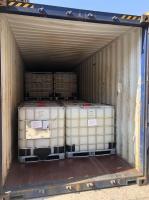Our Products
Polyacrylamide / Equivalent of FENNOPOL K 8656 cationic polyacrylamide can be replaced by Chinafloc C

Cationic polyacrylamide, such as FENNOPOL K 8656, is a water-soluble polymer widely used in industrial processes for solid-liquid separation. Developed by Kemira, FENNOPOL K 8656 is a high-performance cationic polyacrylamide emulsion engineered for rapid inversion, high molecular weight, and effective charge density. It is specifically designed for use in a variety of wastewater treatment, sludge dewatering, and paper manufacturing applications. Its cationic nature allows it to interact effectively with negatively charged particles and colloids, promoting aggregation and flocculation in both municipal and industrial systems.
1. Primary Use: Wastewater Treatment
The foremost application of FENNOPOL K 8656 is in wastewater treatment, where it serves as a flocculant for suspended solids and colloidal particles. The positively charged polymer chains in FENNOPOL K 8656 neutralize negatively charged contaminants (such as clay, organic matter, and microbial debris), facilitating the formation of larger and more settleable flocs.
Applications in Wastewater Treatment:
-
Municipal Sewage Treatment:
Used in primary, secondary, and tertiary stages of municipal wastewater treatment plants (WWTPs) to enhance sludge thickening and reduce sludge volume. It aids in removing biosolids and improves the efficiency of sludge centrifuges and belt presses. -
Industrial Effluent Treatment:
Employed across a wide range of industries (textile, petrochemical, pulp & paper, food and beverage, mining) to clarify process water, recycle water streams, and ensure compliance with discharge standards. FENNOPOL K 8656 is especially suitable for industries where wastewater has high organic or colloidal content. -
Solid-Liquid Separation Units:
Plays a key role in dissolved air flotation (DAF) units, clarifiers, and sedimentation tanks by improving the agglomeration and settleability of particles.
2. Sludge Dewatering and Thickening
FENNOPOL K 8656 is frequently applied in mechanical dewatering processes where sludge volume reduction is essential. Sludge treatment is a critical step in wastewater management, and efficient polymer conditioning helps reduce water content and disposal costs.
Mechanisms in Dewatering:
-
Charge Neutralization and Bridging:
The polymer acts by neutralizing the negative surface charges of sludge particles, allowing them to come together (coagulation), followed by inter-particle bridging that promotes large, firm flocs. -
Improved Cake Solids:
When used in centrifuges, belt filter presses, or screw presses, FENNOPOL K 8656 enhances the dryness of the final cake and improves filtrate clarity. -
Reduced Polymer Dosage and Energy Costs:
Its high activity and fast inversion profile mean lower dosages are required, which saves costs and optimizes operational efficiency.
3. Papermaking and Paper Processing Industry
Cationic polyacrylamides such as FENNOPOL K 8656 are extensively used in the paper and pulp industry, where they function as retention and drainage aids. The polymer improves the retention of fines, fillers, and fibers, increases drainage speed, and enhances paper machine runnability.
Specific Roles in Papermaking:
-
Retention Aid:
Helps in retaining filler materials (e.g., calcium carbonate, kaolin clay) and fines on the forming fabric. Better retention leads to improved sheet quality and reduced white water load. -
Drainage Aid:
Promotes faster water removal from the paper sheet in the wet section, thereby enhancing formation, improving paper strength, and reducing drying energy. -
Fixation Agent:
Helps in fixing anionic trash (e.g., dissolved organic substances and anionic surfactants) onto fibers, thereby maintaining system balance and improving retention system efficiency. -
Dry Strength Agent (Secondary Role):
In some paper grades, cationic PAMs are used to improve the dry strength of paper through hydrogen bonding and polymer bridging mechanisms.
4. Mining and Mineral Processing
Though not its primary use, FENNOPOL K 8656 may be applied in mining operations where flocculation of suspended solids is required.
Applications in Mining:
-
Tailings Management:
Used to treat mine tailings for water recovery and to reduce the environmental impact of tailings ponds. -
Ore Dewatering:
Applied in processes such as thickening and clarification of metal ore slurries.
5. Oil & Gas Industry (Produced Water Treatment)
In upstream oil production, large volumes of produced water must be treated before disposal or reuse. FENNOPOL K 8656 is useful in separating oil and solids from water via DAF systems or clarifiers.
Benefits in Oil & Gas:
-
Removes suspended solids and free/emulsified oil.
-
Improves water clarity for reinjection or discharge.
-
Reduces chemical consumption compared to lower-activity flocculants.
6. Food and Beverage Industry
In food processing facilities (dairy, meat, beverage), wastewater often contains high organic loads and suspended solids. FENNOPOL K 8656 is compatible with food-grade treatment processes (where indirect food contact chemicals are permitted).
Benefits:
-
Enhanced separation of solids in primary clarifiers.
-
Improved sludge thickening in dissolved air flotation.
-
Reduces COD/BOD levels and final effluent turbidity.
7. Advantages of FENNOPOL K 8656 in All Applications
-
Quick-Inversion Emulsion:
Designed for fast inversion in water, making it easy to use in automated systems with minimal make-down time. -
High Molecular Weight and High Charge Density:
Effective even at low dosages and efficient in capturing fine particles. -
Broad pH Compatibility:
Works in acidic and alkaline environments, allowing use across diverse applications and industries. -
Improved System Cleanliness:
Due to reduced carryover of solids and improved filtrate quality. -
Cost-Effective:
Reduces chemical consumption, lowers sludge disposal costs, and increases process throughput.
Conclusion
FENNOPOL K 8656 is a high-performance cationic polyacrylamide tailored for demanding solid-liquid separation applications. Its primary roles are in wastewater treatment, sludge dewatering, and the pulp and paper industry, where it functions as a flocculant, retention and drainage aid, and clarifying agent. With its rapid inversion profile, high molecular weight, and strong cationic charge, FENNOPOL K 8656 delivers efficiency, operational cost savings, and environmental compliance across multiple sectors. Its versatility, reliability, and ease of use make it a preferred choice for engineers and operators managing water and sludge in both municipal and industrial settings.





